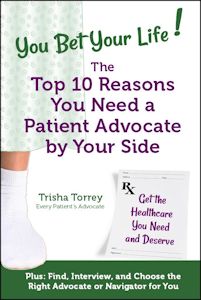They’re getting worse. Or at least it feels that way.
I’ve just spent a week away, traveling across the country for both business and pleasure. While on the road, I’ve talked to dozens of people I’ve never met before. When the subject turned to the “what do you do for a living?” question, and I answered, almost every one of them regaled me with a story, one story more surprising, frightening or tragic than the next. Either they or a loved one have been caught short by the medical care system, leading to inconvenience at the least, or debilitation, a huge financial hit, or even death at the worst.
There’s nothing new about the stories. I know you hear them frequently, too. Sadly, it has become a bigger surprise if someone doesn’t have a story than if they do.
But what disturbs me the most about this can be summed up in one word: Volume.
Now, I have no statistics to back this up, but it seems to me that I’m hearing MORE bad, sad and ugly stories about care AND cost. Or maybe it’s just that peoples’ stories are more heinous or abhorrent than they once were.
Here are the stories from last week alone:
- Care: A man whose surgery was botched, who subsequently developed a softball sized hernia, only to have it lanced by the surgeon who thought it was a pocket of fluid?. Emergency surgery repaired it all, but, seriously? are you kidding me? (Oh, and by the way, this one took place at a well-known and respected-by-the-monied-people hospital in the San Diego area, which also unleashed a staph infection on the same man.)
- Care: Bait-and-switch where the student doctor took over for the experienced surgeon the patient THOUGHT would be doing her surgery. The resulting ugly, livid scar on her face makes it clear who actually performed it.
- Cost: A woman who scheduled her procedure carefully by making sure all providers and facilities were covered by her insurance network, only to receive medical bills weeks later for extra physicians who were called in for consults.
- Cost: Then there is the latest-and-greatest hospital income producing tactic on the backs of seniors – “observation status.” We’re learning, too, that it’s not just Medicare that’s pulling observation status on patients; private insurers are now insisting on it, too. It can end up costing a patient tens of thousands of dollars.
- … and many more.
It just seems like more than ever before, the entire healthcare system is ganging up on patients, making good outcomes difficult or impossible, and sucking every possible cent from their pockets. Intentional obfuscation, calculated “gotchas.” Like a gang war, where the innocent bystanders come out battered and bloodied. (I do not know how those decision-makers live with themselves or sleep at night.)
Knowing the danger at the healthcare system door, how can we advocates help patients best understand our work so they understand and accept that we have their backs?
The more I think about it, the more I realize most of the stories boil down to one thing:
YDKWYDK? You Don’t Know What You Don’t Know
In almost every story, the horrible outcome resulted from a lack of understanding of how the system works. In fact, the patients or caregivers understood so little, that they didn’t even know the questions to ask. They didn’t know to research the surgeon (turns out the hernia surgeon has a track record of the same mistakes), they didn’t know about the emerging pattern of “consults” or the trend of making money through observation status… and those are just the easily identifiable questions.
They didn’t know what they didn’t know, and they didn’t ask an expert, an advocate, to help them formulate the questions, so they all paid the price.
So what’s an advocate to do?
Obstacles create opportunities… and so it is with this concept of YDKWYDK. Let it become a mantra of sorts… when you talk to friends or family or a potential new client. When you do your public speaking, or meet someone on the subway or in the supermarket. In any conversation where it fits – begin talking about YDKWYDK. Tell people you do what you do because You Don’t Know What You Don’t Know. And, of course, it follows that what you don’t know can and will hurt you.
 This is how important this concept is for patients to understand: it’s the very first reason listed in my new book, You Bet Your Life! The Top 10 Reasons You Need a Professional Patient Advocate by Your Side. One whole chapter is devoted to YDKWYDK. And there are nine more reasons as vital as this one for a patient or caregiver to hire you.
This is how important this concept is for patients to understand: it’s the very first reason listed in my new book, You Bet Your Life! The Top 10 Reasons You Need a Professional Patient Advocate by Your Side. One whole chapter is devoted to YDKWYDK. And there are nine more reasons as vital as this one for a patient or caregiver to hire you.
Curious about the book? Here’s what you need to know about it:
It was written to be used as a marketing tool for advocates to give to potential clients to help them make that leap to hiring an advocate to help them navigate their dangerous journeys. By the time a patient finishes reading it, they can’t enlist an advocate fast enough.
The book is available for free to members of The Alliance of Professional Health Advocates in digital form. Instructions for getting a free copy are found linked from member dashboards.
APHA Premium members even have the ability to gift a copy to potential clients, to support their marketing efforts.
Or, the book can be purchased through Amazon, Barnes & Noble, Smashwords, or its own website.
The hope, of course, is to help those patients and caregivers understand the danger of navigating the system without expert help – your help – so they find better outcomes, learning to ask the right questions, with you as a resource for the best answers.
Success will be gauged when the stories begin to wane. That will happen only for advocate-assisted patients. Hopefully YOU will be their advocate.
LEARN ABOUT APHA MEMBERSHIP | FIND MORE REASONS PATIENTS NEED ADVOCATES





Another great article Trisha!! I didn’t realize the virtual book opportunity. Thank you for pointing that out. Downloading it today! I hear about both of these issues frequently. My question is does the book address the Observation status issue? Additionally, the outside consult. Where night I find information for both of these issues and the patients rights for safeguards to prevent both situations.
Hi Sandy – no, the book does not develop either concept (observation or consults) although it uses them as examples. All of these problems come and go as new legislation is passed and implemented, or as policies are changed, so it wouldn’t make sense to describe them in depth in a book which is all but permanent.
However – these issues are discussed regularly in the APHA Discussion Forum – as you know, because you have particpated! In fact, the observation status discussion is found in a post from just last week, as are “surprise bills” addressing those “consults” that patients fall prey to when they don’t know what they don’t know, and when they don’t know the questions to ask.
The Discussion Forum is open to APHA members only.
One of many concerns that I have with the “observation status” – what if you realize that you are in this situation and can’t afford to stay? You leave AMA and what are the repercussions with Medicare? This is a lose-lose situation and the medical bills!
Sandy – great question to ask in the Forum where there is quite a robust conversation taking place: https://www.linkedin.com/grp/post/3106684-6043077384700207104?trk=groups-post-b-title
Trisha – Thank you for sharing your knowledge and experiences. I find (and I’m sure we all find) the same stories while traveling or bumping into an aquaintance at the grocery store. I hear it from receptionists and nurses and doctors too! One hundred percent of the time I hear – “Good for you! What you are doing is so needed and so important!” Thank you for your guidance in our increasingly impactful work Trisha!
The one word “volume” clearly emphasizes the need for patient advocates. Thanks for an informative article.
Professional organizers are also a great resource for patients. Having a system to refer back to previous health conditions, medications and treatments helps them to have a resource in their healthcare journey. Speaking from personal experience, it was a nightmare just getting providers all on the same page when they were not only out of different offices, but different care systems.
And speaking from a previous health care administration perspective, simply knowing what questions to ask is only the first step. You also have to know what ELSE to ask. ie – is this covered leads should be followed up with what exclusions are there to this care?